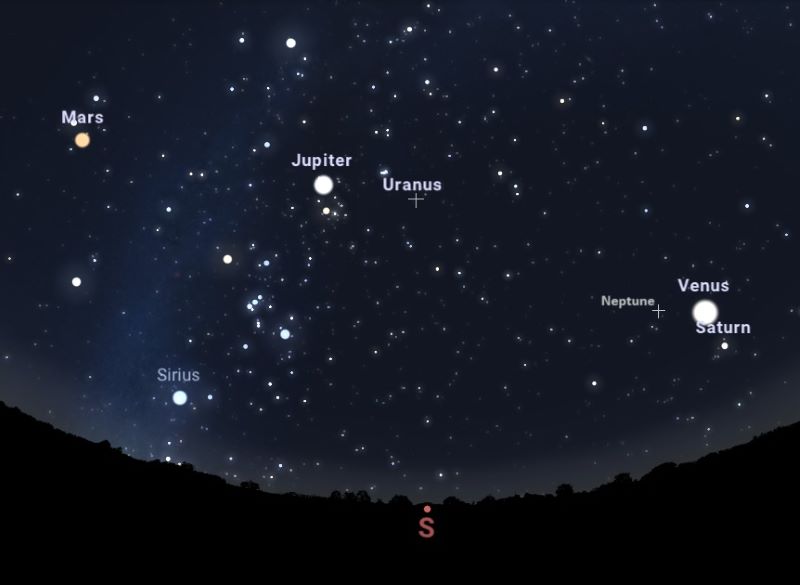Look up at the sky, scanning west to east on January 25, 2025 after the sun sets and darkness falls.
If you are in the mid latitudes of the Northern Hemisphere, about 90 minutes after dark, you might find:

You’ll be able to see 4 bright planets and 2 dim ones if you use binoculars.
Look after sunset
Start in the west, where the sun has just set. As the sky darkens, you’ll spot Venus easily, because it shines more brightly than any star.
Golden Saturn is closer to the horizon below Venus in the sky and is more visible as the sky gets darker.
There are two other planets that you can see with your eyes alone. Jupiter is bright and higher in the sky than Venus. Mars is reddish and rises in the east soon after dark.
But if you have access to binoculars or a telescope, you’ll also be able to see Uranus and Neptune in a dark sky.
Once you have spotted the first four planets, you can see they trace a rough line from one horizon to the other. Uranus and Neptune will be along that line.
Nearby Jupiter, you’ll see a fuzzy, dipper-shaped cluster of stars … it’s called the Pleiades, or Seven Sisters. Looking through binoculars, you can find Uranus not too far away from the Pleiades as in the picture above.
Neptune is dimmer even than Uranus. But it’s near some other bright objects now: dazzling Venus and bright, golden Saturn.
How does sky watching make you feel?
When you are captivated by seeing stars and planets in the night sky, what happens to the stress of the day? How do you feel?
Scientific studies have confirmed that spending time in Nature, especially when living in an urban environment, helps dissolve the stress of the day and increase positive emotions. Now researchers have gone beyond looking at daytime effects to gazing at the stars at night.
One study published in February 2024 found that people with a greater connection to the night sky had better mental health and felt happier. They speculated that the peace they feel might be because they are less visually stimulated and see very little movement compared to during daytime. It also might be because the vast sky inspires awe.
Feelings of awe have been shown to reduce inflammation, lower the heart rate and increase the presence of the hormone oxytocin, boosting positive emotions.
They do this because ruminating over worries, experiencing negative thought or believing you’re personally responsible for bad things happening falls away as we feel awe, appreciating something bigger than ourselves.
Adrian West, astronomer and presenter of the Night Sky Show live events, says “when you’re looking out into the great unknown, you feel like your mundane earthly problems aren’t so important anymore.”
In addition, the experience of being outside at night can be enriched by being with other people as you connect with them.
It can also be a mindful practice, where you let go of all judgement and feel the magic of being in time and space.
Is that enough to go out and enjoy the night sky?
Help make it a dark sky
You can see the planets and stars the best in a dark night sky.
In my blog Good Night Darkness, I explored the benefits of being in the darkness at night and how we are losing it.
“We humans need darkness for our soul and to ponder our place in the Universe. We need it for creative expression. Darkness is part of the cycle of life where we feel lost, then are able to go deep and find a new way.”
We also need the darkness for our circadian rhythms and sleep which have an impact on our immune systems, blood sugar control, and mood, plus more.
Yavapai County has a dark sky ordinance, as well as the City of Cottonwood has a dark sky city designation. One stated purpose is to provide a more pristine nighttime environment free from light pollution, waste, trespass, or clutter while providing nighttime safety, security and productivity. And remember, Flagstaff was the first Dark Sky city to protect the viewing environment for Lowell observatory, where Pluto was discovered.
What can you do to ensure a dark sky so that you can be in awe of the sky and see this particular planetary alignment?





